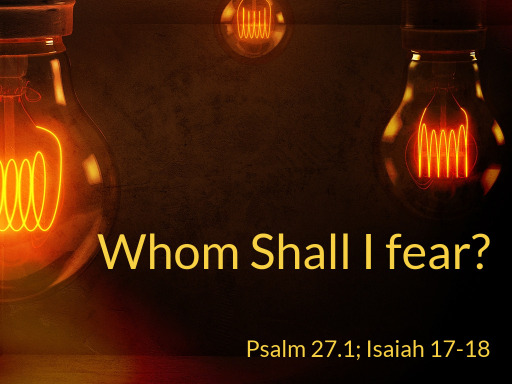Whom Shall I fear?

Sermon • Submitted • Presented • 30:57
0 ratings
· 187 viewsFiles
Notes
Transcript
Sermon Tone Analysis
A
D
F
J
S
Emotion
A
C
T
Language
O
C
E
A
E
Social
The reason these oracles of judgment are being written in the first place, is to remind Judah that they should not trust in nations that God is going to one day judge.
Chapter 17 and 18 strike at the heart of this matter. Damascus, Syria and the Northern Kingdom of Israel had attacked Judah, the Southern Kingdom. Ahaz had turned to outlying nations and their idols looking for alliances for protection etc.
God had told Ahaz over and over again through Isaiah that Ahaz was leading the people astray. God was their refuge, their strength, their protection, their provision, THEIR GOD.
Question: If all the Nations of the world are subject to God Almighty, why should Judah fear the Nations or trust any of them?
Don’t fear or trust what is fleeting
Don’t fear or trust what is fleeting
An oracle against Damascus:
Look, Damascus is no longer a city.
It has become a ruined heap.
The cities of Aroer are forsaken;
they will be places for flocks.
They will lie down without fear.
The fortress disappears from Ephraim,
and a kingdom from Damascus.
The remnant of Aram will be
like the splendor of the Israelites.
This is the declaration of the Lord of Hosts.
Judgment Can Bring about Restoration
Judgment Can Bring about Restoration
On that day people will look to their Maker and will turn their eyes to the Holy One of Israel. They will not look to the altars they made with their hands or to the Asherahs and incense altars they made with their fingers.
One of the major themes of Isaiah is that God will restore people.
God often uses life as a classroom. We are often slow to learn the lessons.
God is God and we are not.
God is to be worshipped, and nothing else.
God is the lone source of all we need, and should be the chief desire of our hearts.
We sing many times that He is a “good, good Father.”
Part of His goodness is to let us learn some things the hard way… letting us venture into our own choices while all the time seeking to draw us to Himself. The further we go into our own choices, the more consequences there are and the more God turns up the heat. Nonetheless, I believe He pleads with us through it all.
Repent. Come to me. Let me be your source. Though you have sinned there is mercy and pardon, pardon for you and for me.
(Softly and Tenderly)
God Works on His Own Schedule
God Works on His Own Schedule
For, the Lord said to me:
I will quietly look out from My place,
like shimmering heat in sunshine,
like a rain cloud in harvest heat.
The context of chapter 18 is that An Ethiopian King has taken over Egypt (called a land of buzzing insects) and he is sending out tall, smooth-skinned delegates trying to build a coalition of forces against Assyria.
Isaiah is turning this around. He says God is the King of the World. He wants delegates to be sent to Egypt to tell them to line up with God.
Don’t mistake God’s silence with lack of ability.
Isaiah says God watches quietly until He’s done watching.
Just because God is silent doesn’t mean what you are doing is going unnoticed. He will judge sin.
Just because God is silent doesn’t mean that God isn’t hearing your prayers. He will answer in His time and it will be on time everytime when He does answer.
Just because God is silent, it doesn’t mean He doesn’t exist, or doesn’t care.
Again our business… our responsibility is to neither fear nor trust in anyone or anything but God Himself.